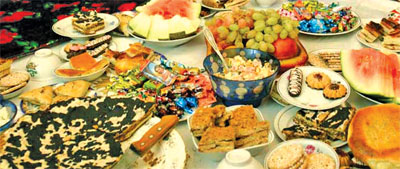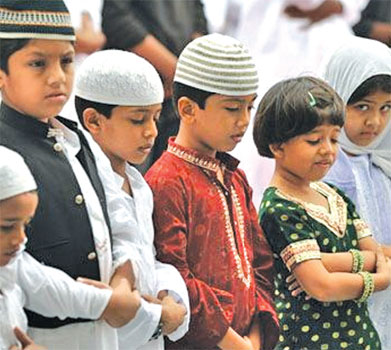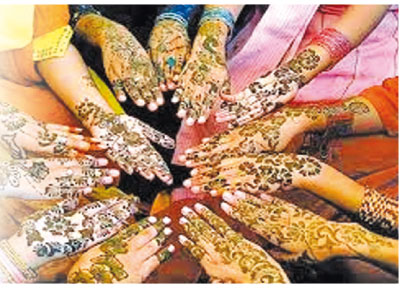|
Eid-ul-Fitr:
Celebrations to mark end of Ramazan
Eid, popularly known as Eid-ul-Fitr, is a festival observed by the
Muslim community to celebrate the conclusion of the month of fasting.
 Eid-ul-Fitr literally means 'festival of breaking the fast'. Like
other festivals observed by the Muslim community, this festival
symbolises faith. Eid-ul-Fitr literally means 'festival of breaking the fast'. Like
other festivals observed by the Muslim community, this festival
symbolises faith.
The festival is celebrated based on an Islamic belief by following
the form of social practice.
Eid is celebrated on the first date of Shawwal, that is, the tenth
month of the Hijra calendar. During the festival, Muslims exchange
gifts, greeting their neighbours as a mark of solidarity and
brotherhood.
According to the Islamic tradition, there are two festivals observed
by Muslims every year, Eid-ul-Fitr just after Ramazan and Eid-ul-Azha in
the month of Haj.
Ramazan, the month of fasting, symbolises a lot practices and beliefs
of the community. It is not merely restraining oneself from having food
but also to abstain from all kinds of evil and unlawful practices in
Islam.

Muslims, just before the celebrations of Eid-ul-Fitr, keep a month
long fast throughout the month of Ramazan. The practice of fasting is
also known as 'roza' that starts from the break of dawn till dusk and
during this whole day an individual has to refrain himself from
drinking, eating or having sexual intercourse. The term 'roza' is an
Arabic word that means abstinence. This year Eid-ul-Fitr will be
celebrated on August 29, depending on the sighting of the moon, to mark
the end of Ramazan, the Islamic holy month of fasting.
On this joyous occasion Muslims throughout the world celebrate the
Eid- ul-Fitr, Ramazan festival after a month -long fast. This festival
generates immense satisfaction among children and adults purely due to
the completion of the fast as commanded by Allah.
Fasting along with Zakath (tax incumbent on rich Muslims) occupies a
prominent place in the month of Ramazan to uplift the suffering of the
underprivileged segments of society, educates us to look into the needs
of society at all times. On this day Muslims are not permitted to fast.
Many Muslims believe that fasting is a time when every Muslim
realises a sense of responsibility within themselves.
The month- long fast ends with the festival of Eid-ul-Fitr which
symbolises a reward for their fasting.
 Muslims on this day wear their best clothes and offer 'namaz'- a
congregational prayer at masjids or mosques. After offering their
prayers they exchange good wishes of the festival with neighbours and
other people. They also donate alms to the poor on the auspicious
occasion. Muslims on this day wear their best clothes and offer 'namaz'- a
congregational prayer at masjids or mosques. After offering their
prayers they exchange good wishes of the festival with neighbours and
other people. They also donate alms to the poor on the auspicious
occasion.
The celebration of Eid-ul-Fitr not only has religious essence but
also carries a social connotation.
Like other festivals, Eid-ul-Fitr is also observed with great
enthusiasm. Delicious food and drinks are an indispensable part of the
festivity.
People decorate their houses and prepare luscious traditional sweets
and cuisine to celebrate the festival. The most common food is
wattalappan which is a must in every home. This is a pudding made out of
jaggery , eggs and coconut milk.
Moreover, ahead of the festival, the markets are filled with
fascinating items in the shopping list for Eid. Fancy and food items
mostly dominate the festival and as the festival approaches excitement
to celebrate gains momentum not only with the Muslims but also with
shopkeepers and traders doing a brisk business.
The celebration of Eid-ul-Fitr no-doubt perks up the spirit inherent
in all the festivity. The significance of this festival is also
interpreted as a good time to bring people together in harmony and
gratitude.- Internet - Compiled by Ruzaik Farook |

